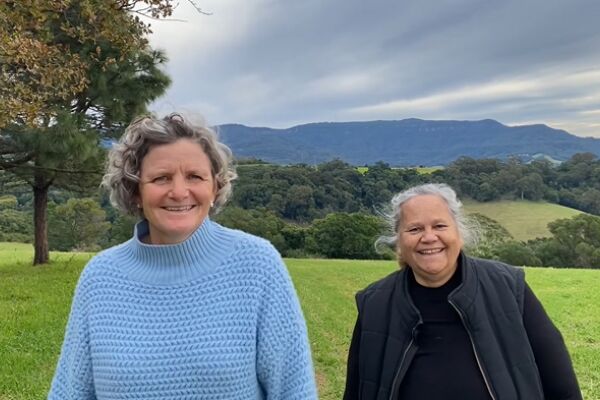News
Collaborate and ‘design a way forward’ towards reconciliation
newsGP talks to allyship leaders about the steps GPs can take to promote national reconciliation.
 ‘Be Brave. Make Change’ is the 2022 theme for National Reconciliation Week.
‘Be Brave. Make Change’ is the 2022 theme for National Reconciliation Week.
Reflect: identify what is the heart of the matter. Relate: put yourself in the other person’s shoes. Reconcile: design a way forward together.
The ‘three Rs’ were developed to strengthen allyship and kinship by the co-directors of cultural awareness training organisation, Evolve Communities.
Aunty Munya Andrews, a Bardi Elder originally from the Kimberley region of Western Australia, is a lawyer and educator. Carla Rogers is a training facilitator and community engagement specialist. The two have worked closely together since 2011 to strengthen partnerships between Aboriginal and Torres Strait Islander peoples and non-Indigenous Australians.
To mark National Reconciliation Week, Aunty Munya and Ms Rogers spoke with newsGP about how the three Rs align with this year’s theme – ‘Be Brave. Make Change’ – and highlight the important role of courage in reconciliation, which GPs can apply to their practice.
‘It is a really simple three-step approach that GPs could apply when they’re exploring something with one of their patients,’ Ms Rogers said.
‘Immerse yourself in that understanding, learn more about Aboriginal people’s identity – connection to country is all about healing.
‘The land is sick, people are sick. Healthy country, healthy people.’
Outside the GP community, all Australians can learn more about these values and collaborate to ‘design a way forward together’ towards reconciliation.
For Aunty Munya, it’s about everybody playing their part.
‘Lightening the burden for us [as Aboriginal and Torres Strait Islander peoples] and not having to speak all the time, just relieves us of that burden and makes reconciliation a far more achievable goal than otherwise if it’s just left to us,’ she said.
The RACGP’s Reconciliation Action Plan helps to cement a culturally safe organisation that supports continuous education and learning for its staff and members, through a commitment to improve the knowledge and skills required to deliver culturally responsive health services to Aboriginal and Torres Strait Islander peoples, based on strong relationships with mutual respect.
There are a ‘range of commitments’ that GPs have already made for reconciliation, according to Ms Rogers.
‘And that really made us smile, because that’s exactly what we do in our programs – we ask people to make a personal commitment, [for example] commit to learning more about the traditional owners where they live,’ she said.
‘When we are talking about courageous acts, that can be taking an informed risk. They don’t have to be massive things – you can start fairly small.
‘For GPs, like anybody, it’s about stepping up to educate and immerse ourselves in that understanding and stories, and there’s so much that is relevant to GPs to create a safe environment to contribute towards closing the gap so people feel comfortable to come in and to engage with them.’
These include simple things like making the practice welcoming by displaying the Aboriginal and Torres Strait Islander map of Australia and Acknowledgement of Country, and learning about what kinship means for Aboriginal and Torres Strait Islander peoples.
‘There’s so many general practices wanting to do the right thing,’ Ms Rogers said.
‘We know they’re super busy, but we try to make [all our resources] bite-size and implementable so that they can integrate it with the way that they’re working.’

Carla Rogers (left) and Aunty Munya Andrews believe that all Australians have a connection to country – an important part of healing and allyship.
Aunty Munya and Ms Rogers are co-authors of Practical Reconciliation, a seven-step guide to allyship that forms a framework that all Australians can learn to take courageous and confident action: diversity, communication, privilege, reconciliation, history, kinship, allyship.
‘It’s all about the simple steps that everyone can take to make change,’ Ms Rogers said.
Aunty Munya agrees.
‘These are basic building blocks that are important and practical things to do about taking action,’ she said.
‘It’s a reminder to people also that it’s more than words: one can call themselves an ally, but you have to demonstrate it with actions, and that’s what I like about this year’s [Reconciliation Week] theme – it’s all about taking action.’
A key objective of the seven steps to allyship is to strengthen relationships to help achieve reconciliation.
‘We talk a lot about one in 30 or only 3% of our population in Australia being Aboriginal or Torres Strait Islander,’ Ms Rogers said.
‘Imagine yourself in a room of 30 people – 29 of those people are going to be non-Indigenous, like myself. So those seven steps provide the skills and confidence for the 29 in 30 to speak up and take courageous action.’
As part of National Reconciliation Week running 27 May – 3 June, Evolve Communities is hosting a webinar and Q&A session for RACGP staff on 2 June.
The webinar will be presented as a ‘hard yarn’ session by Aunty Munya and Ms Rogers, who will look at the role of courage and what it means, unpacking how to create a safe space to have courageous conversations.
‘[We want to] challenge all Australians to have a look at the unfinished business of reconciliation … and how it relates to the gap that exists between Indigenous and non-Indigenous Australians,’ Ms Rogers said.
‘We have so much to learn from Indigenous wisdom about healing.’
Log in below to join the conversation.
Aboriginal and Torres Strait Islander health cultural awareness Reconciliation Week
newsGP weekly poll
Health practitioners found guilty of sexual misconduct will soon have the finding permanently recorded on their public register record. Do you support this change?